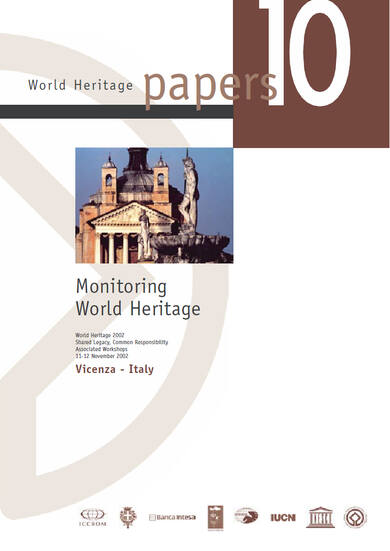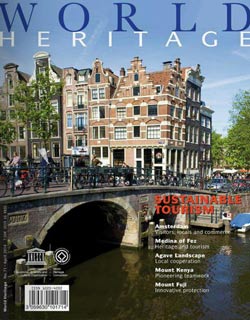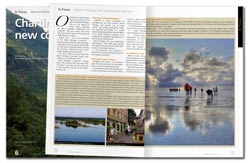To mark the 30th anniversary of the Convention Concerning the Protection of the World Cultural and Natural Heritage, UNESCO with the support of the Government of Italy organized, from 14 to 16 November 2002, an International Congress to reflect on some of the main issues, achievements and challenges of the World Heritage mission.
Over 600 experts from around the world gathered at the Giorgio Cini Foundation on the island of San Giorgio in Venice, Italy, to discuss the evolution of the World Heritage Convention and consider its role for the future. In addition, some 400 experts gathered immediately prior to the Congress at nine associated workshops in different Italian cities to reflect on the major themes of the Congress. The nine workshops were:
- The Legal Tools for World Heritage Conservation, Siena
- Cultural Landscapes: the Challenges of Conservation, Ferrara
- Towards Innovative Partnerships for World Heritage, Venice
- Partnerships for World Heritage Cities, Urbino-Pesaro
- Monitoring World Heritage, Vicenza
- Partnerships to Conserve Nature and Biodiversity, Trieste
- World Heritage University Training, Feltre
- World Heritage Site Management, Padua
- Mobilizing Youth for World Heritage, Treviso
This publication aims to reflect the discussions and debates around the specific themes as they were discussed over the two days of the workshop. The summary reports of all workshops are available in the Venice Congress proceedings publication.
Table of Contents
Preface Francesco Bandarin
Advisory Bodies and World Heritage Committee
Monitoring World Heritage: A View from the World Heritage Committee’s Delegate
Benedicte Selfslagh, Rapporteur, World Heritage Committee, Belgium
An Advisory Body View of the Development of Monitoring for World Cultural Heritage
Herb Stovel, Heritage Settlements Unit Director, ICCROM
Monitoring the State of Conservation of World Heritage Properties: Operational Aspects (ICOMOS - Advisory Body)
Regina Durighello, Director World Heritage programme, ICOMOS
The WCPA Management Effectiveness Evaluation Framework – a basis for Developing Monitoring and Evaluation Programs to Assess Management of Protected Areas
Marc Hockings, Senior Lecturer, School of Natural and Rural Systems Management, University of Queensland, Australia
World Heritage Monitoring and Periodic Reporting Experiences
Monitoring and Reporting in the Context of the World Heritage Convention and its Application in Latin America and the Caribbean
Herman van Hooff, UNESCO office, Montevideo, Uruguay
Improving Monitoring for World Heritage Conservation
Giovanni Boccardi, Programme Specialist, World Heritage Centre
Lessons learned from the Periodic Reporting Process in Africa
Elizabeth Wangari, Senior Programme Specialist, World Heritage Centre
Monitoring Frameworks/Design of Monitoring Systems
The Importance of Clear Objectives for Monitoring World Heritage Area Sites
Bruce Mapstone, CRC Reef Research Centre, James Cook University, Australia
Monitoring Processes of Change in Historic Centres: A Case Study of Fes, Morocco
Mona Serageldin, Adjunct Professor of Urban Planning, Harvard University, U.S.A
Assessing Management Effectiveness of Natural World Heritage Sites
Sue Stolton, Equilibrium Consultants, U.K.
Monitoring World Heritage Sites
Christopher Pound, Consultant Architect, ICOMOS, U.K.
Practical Experiences in Monitoring
Cultural Context, Monitoring and Management Effectiveness (Role of Monitoring and its Application at National Levels)
Gamini Wijesuriya, Principal Regional Scientist of the Department of Conservation of the Government of New Zealand
Monitoring and Reporting in Natural World Heritage Areas A World Heritage Manager’s Perspective
Jon Day, Great Barrier Reef Marine Park Authority, Australia
Monitoring of Andean Cultural Heritage Sites
Mireya Muñoz, ICOMOS, Bolivia
Management Effectiveness Monitoring and Reporting in Sangay National Park (Ecuador)
Jorge Rivas, Coordinator, Sangay Project, Fundación Natura, Ecuador
Monitoring Technologies and Tools
Computerised Heritage Information Systems and Monitoring the Complexity of Change
Paulius Kulikauskas, Head, International Projects, Research and Development, Byfornyelse, Denmark
Use of Satellite Imagery and Geographical Information Systems to Monitor World Heritage Sites
Mario Hernandez, World Heritage Centre
Monitoring Heritage Properties. Monitoring Heritage Values in the Environment
Fleming Aalund, ICOMOS, Denmark
Monitoring the Conservation of Historical Heritage through a Participatory Process
Sueli Schiffer, Professor, Universidade de Sao Paulo, Brazil
Conclusions
Summary of Final Discussion - Vicenza Monitoring Workshop
Marc Hockings, Senior Lecturer, School of Natural and Rural Systems Management, University of Queensland, Australia
Annexes
Annex 1: Workshop Programme
Annex 2: List of Participants
Annex 3: Summary of Workshop Discussions
Annex 4: Monitoring World Heritage - Conclusions of the International Workshop
Giovanni Boccardi and Herb Stovel








